5 Healthiest Drinks To Give You Energy

Do you suffer from the 3 o’clock slump and need to run out and grab a pick-me-up? Many folks do just that, but don’t realize that they aren’t always grabbing the beverage that will give them energy per se. Here’s a look at how you get energy from your bevies and five healthy drinks you can sip on to give you that oomph you’re looking for.
Energy versus stimulants
The term “energy drink” is actually a misnomer. They should really be called stimulant drinks not energy drinks especially if they don’t contain calories. The body converts calories, which come from food, into energy you can use. The quickest form of energy your body can use is carbs, especially simple carbs like sugar. If you’re grabbing something with caffeine or something like guarana, you’re actually gulping down a stimulant—not “energy.”
If you choose to have a stimulant in your beverage, that is alright as long as it’s done in a safe manner. Caffeine is Generally Recognized as Safe (GRAS) by the Food and Drug Administration (FDA). They recommend no more than 400 milligrams of caffeine (or 3 to 4 cups) per day. Overdoing it on caffeine can lead to potentially dangerous side effects such as insomnia, nervousness, restlessness, and increased heart rate.
The regulation of energy drinks
Most drinks labeled as “energy drinks” are sold as dietary supplements, not beverages. As such, they aren’t well regulated by the FDA. This means that the ingredients, ingredient amounts, and even nutritional info you find listed under the “supplemental facts” aren’t necessarily accurate.
In addition, most energy drinks have too much added sugar and are packed with stimulants like caffeine, guarana, and even B vitamins (touted to help “get energy” from your macros). Although when taken on occasion is okay, drinking these types of beverages regularly can have negative effects on your body including increased heart rate, sleep disturbances, and upset stomach.
Nowadays you can also find herbal supplements added to energy drinks, and many of these supplements interact with health conditions (like diabetes) or medications you may be taking. And if you’re opting for the sugar-free drink, you’re cutting out the added sugar but also the source of energy.
Below you’ll find five healthy drink options that will give you energy. Some do have a stimulant (specifically, caffeine, which again is okay as long as the caffeine is consumed in moderation) plus energy in the form of calories. In addition, carbs (or sugar) certainly can provide energy but you also want to keep in mind that the 2020-2025 Dietary Guidelines for Americans recommends no more than 10% of total calories come from added sugar. The beverages below do use natural sugars like lactose found in milk or fructose found in 100% juice. If you do choose to add honey, granulated sugar, or any other type of added sugar, then do add in very small amounts (no more than 1 teaspoon per cup). Read on, and for more, don’t miss #1 Best Drink to Give You Energy, Says Dietitian.
Coffee
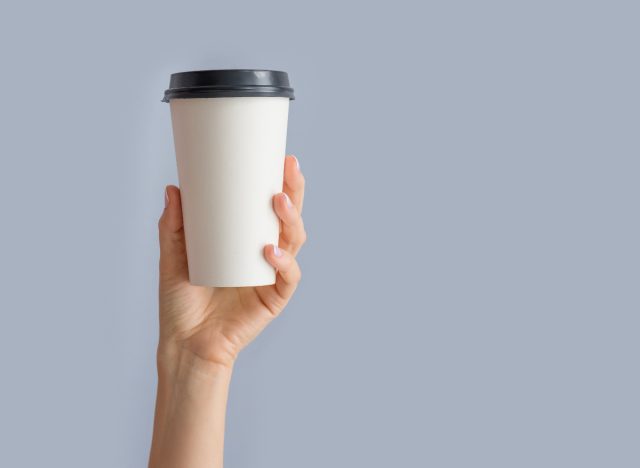
Don’t worry, I won’t recommend taking away your beloved coffee! If you want to have an energy drink with a stimulant like caffeine, you can do so safely with coffee. Plus, coffee does provide some health benefits. A 2022 published study found that moderate coffee consumption (2 to 5 cups per day) has been consistently associated with a lower risk of cardiovascular disease. So as long as you stay within the recommended guidelines of no more than 400 milligrams of caffeine per day, you should be okay. You can add energy sources to your coffee by including foods with calories (mostly from carbs like sugar) such as a splash of low-fat milk, creamer, or one teaspoon of sugar.
Tea
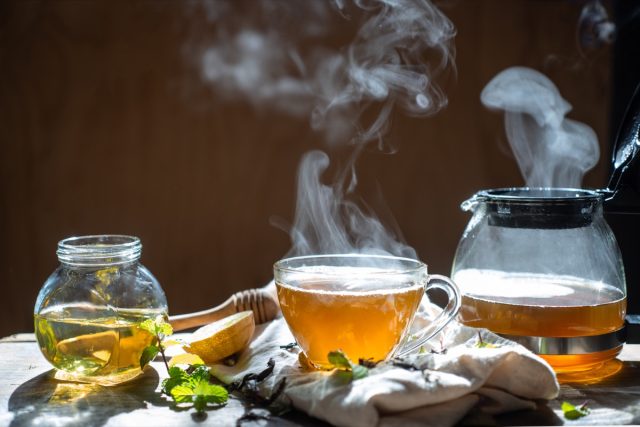
For tea drinkers, you can enjoy caffeinated tea as a stimulant and add energy with a splash of milk or a teaspoon of agave or honey in either a hot or cold cup. Tea contains antioxidants called flavonoids which may help protect the body from free radicals that can contribute to chronic diseases like cancer and heart disease. Black and green tea has caffeine but even if you choose decaf or herbal varieties, that splash of milk or a teaspoon of agave or honey is what’s giving you energy.
Milk
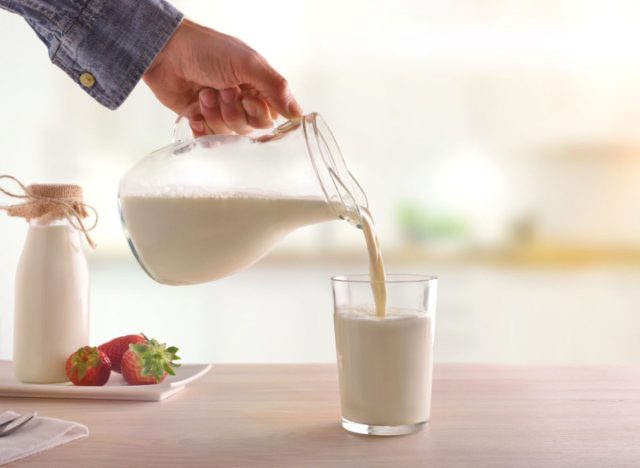
There are natural carbs called lactose found in milk that will give you energy. Plus, one cup of milk provides 13 essential nutrients including protein, calcium, vitamins A and D, and numerous B vitamins (niacin, pantothenic acid, riboflavin, and niacin).
According to the 2020-2025 Dietary Guidelines, choose low-fat and nonfat milk most of the time to help keep calories and saturated fat in check. And if you’re looking for a stimulant, opt for a glass of hot cocoa or chocolate milk as chocolate provides caffeine.
Red Bull
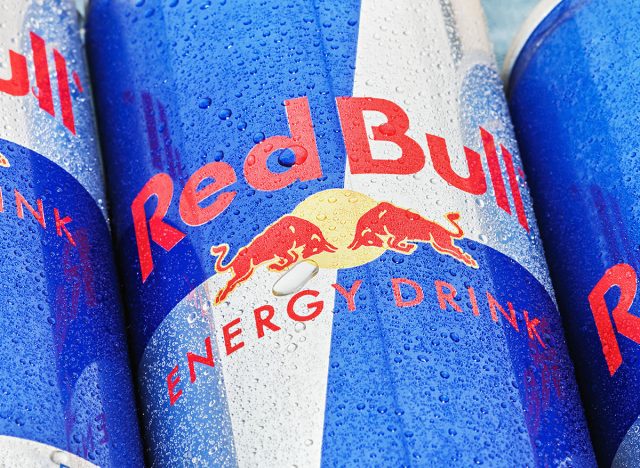
Although as a registered dietitian I don’t advocate the regular consumption of energy drinks, if you’re going to choose one I recommend Red Bull. This is because Red Bull is regulated by the FDA, which means that the ingredients, amounts, and nutrition info listed on the label are actually in the beverage you’re drinking. One 8.4-fluid-ounce can of the original flavor provides 110 calories, 80 milligrams of caffeine, sugar, B vitamins, and taurine. It should be noted that studies suggest that taurine can improve mental performance when combined with caffeine, however, the findings are controversial and more research is needed.
100% Orange Juice
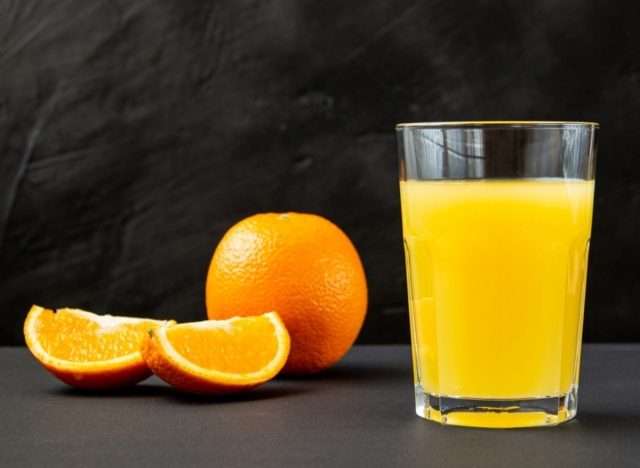
According to the 2020-2025 Dietary Guidelines, non-calorie beverages like water is certainly your number one choice, but other beverages like milk and 100% juice do provide nutrients and can also be included in a healthy diet. One cup (or 8 fluid ounces) of 100% orange juice provides 120 calories and 21 grams of natural sugars from the fruit. In addition to one cup of 100% OJ being an excellent source of vitamin C, it is also one of the few food sources of the flavonoid hesperidin. A 2021 published study found that orange juice containing hesperidin significantly reduced blood pressure in adults diagnosed with pre- or stage-1 hypertension. That doesn’t mean you need to guzzle down bottles at a time. The standard serving size for 100% orange juice (as listed on the Nutrition Facts Panel) is 8 fluid ounces.







